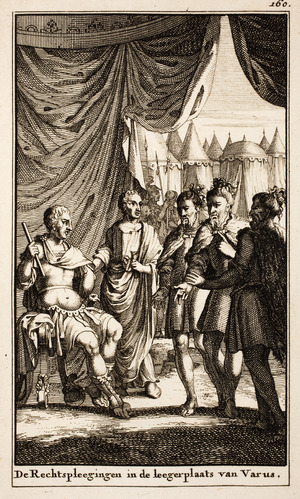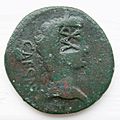Publius Quinctilius Varus facts for kids
Publius Quinctilius Varus (born in Cremona in 46 BC – died in Teutoburg Forest in AD 9) was an important Roman general and politician. He served under the first Roman emperor, Augustus. Varus is mostly remembered for a major Roman defeat in the Battle of the Teutoburg Forest.
Contents
Early Life and Career
Varus came from an old Roman family, but they were not very rich or famous at the time. His father was a senator who fought against Julius Caesar in a civil war. Even though his father was on the losing side, Varus later became a strong supporter of Caesar's adopted son, Octavian.
Varus became good friends with important Roman leaders. When Marcus Vipsanius Agrippa, a close friend of Augustus, died, Varus gave a speech at his funeral. This helped his career a lot. In 13 BC, Varus became a Roman consul, which was a very high political position. He shared this role with Tiberius, who would later become emperor.
Family Life
Varus married Vipsania, who was the daughter of Marcus Agrippa. We don't know much about what happened to Vipsania.
Later, Varus married Claudia Pulchra. She was a grand-niece of Emperor Augustus, which showed that Varus was still very well-liked and important in Roman politics. Varus and Pulchra had a son, also named Publius Quinctilius Varus.
Political Roles
From 8 to 7 BC, Varus was the governor of the Roman province of Africa. After that, he governed Syria from 7 BC to 4 BC. He had four Roman legions under his command there. Varus was known for being strict and for collecting high taxes in Syria.
The historian Josephus wrote about Varus's quick actions in Judaea. After the death of King Herod the Great in 4 BC, there was a revolt. Varus marched into Jerusalem and dealt with the rebels. This made many Jewish people angry at Rome. In fact, people started to avoid buying Roman pottery as a way to protest Varus's actions.
Between 10 BC and 6 AD, Roman generals like Tiberius and Germanicus fought many battles in Germania. This was the area north of the Danube river and east of the Rhine river. Rome wanted to expand its empire and shorten its borders. They managed to control several Germanic tribes, including the Cherusci. In 6 AD, Tiberius announced that Germania was peaceful.
In 7 AD, Emperor Augustus made Publius Quinctilius Varus the first official governor of the new Roman province of Germania.
Battle of the Teutoburg Forest and Death
In September 9 AD, Varus was getting ready to move his three legions – the Seventeenth, Eighteenth, and Nineteenth – from their summer camp. He planned to march them to a city called Moguntiacum (modern-day Mainz).
Suddenly, news arrived from a Germanic prince named Arminius. Arminius was a Roman citizen and a leader of a Roman cavalry unit. He told Varus that a revolt was starting in the Rhine area. Varus was warned by another Germanic leader, Segestes, not to trust Arminius. But Varus ignored the warning and marched his soldiers following Arminius's lead.
Varus made a big mistake by trusting Arminius. He also led his legions into a place where they could not fight well. The area was heavily forested and swampy, which made it hard for the Roman soldiers to move in their usual formations. Arminius and the Cherusci tribe, along with their allies, had set up a clever ambush. The Romans marched right into it in the Battle of the Teutoburg Forest, near Kalkriese.
The battle lasted for three days. The Germanic tribes overwhelmed the Romans. Some Roman cavalry tried to escape, but they were caught and killed. Varus himself died during the battle. Arminius cut off Varus's head and sent it to another Germanic king, Marbod. However, Marbod did not want to join Arminius and sent the head to Rome for burial.
Some Roman soldiers who were captured were killed, while others were enslaved. The Romans later managed to get back the eagles (special flags) of their lost legions in later years.
Aftermath
The defeat at the Teutoburg Forest was a huge shock for Rome. It was so bad that the Seventeenth, Eighteenth, and Nineteenth legions were never used again in the Roman army. Emperor Augustus was very sad about the loss. It is said that for years he would sometimes cry out, "Quinctilius Varus, give me back my legions!" Roman historians called the battle the clades Variana, meaning "Varian disaster."
Varus's reputation in Rome was ruined. The government blamed him for the defeat. His son's chances for a political career were also destroyed. Even Tiberius, who had recommended Varus for the governor position, faced strong criticism.
About 40 years after Varus's death, a Roman general found some prisoners from Varus's army in Germany. Emperor Claudius welcomed them home, and their stories made many Romans feel great pity for them.
Cultural Depictions
- I, Claudius (1934) by Robert Graves: This novel is about the first four Roman emperors. Varus does not appear, but his defeat is an important event.
- The Iron Hand of Mars (1994) by Lindsey Davis: This mystery novel is set during the time of Emperor Vespasian. Part of the story takes place in the Teutoburg Forest.
- Give Me Back My Legions! (2009) by Harry Turtledove: This book tells the story leading up to the battle and includes a lot of information about Varus.
- Undying Mercenaries (2014) by B. V. Larson: This book series is set in the year 2099. The main character fights with a group called the Earth Mercenary Legion Varus, which takes inspiration from Roman history.
- Schlammschlacht (2015) by Heilung: This song describes the Battle of the Teutoburg Forest from the point of view of the Cherusci tribe.
- Varus is played by Gaetano Aronica in the Netflix series Barbarians.
Images for kids
See also
 In Spanish: Publio Quintilio Varo para niños
In Spanish: Publio Quintilio Varo para niños
 | Calvin Brent |
 | Walter T. Bailey |
 | Martha Cassell Thompson |
 | Alberta Jeannette Cassell |



